
8 Best Microsoft Planner Competitors and Alternatives for 2024
-
by Anoop Singh
- 10
- Best for simple project needs: Trello
- Best for customization of big projects: Clickup
- Best for upgrading tech stacks: Zoho Projects
- Best for collaboration on a budget: Asana
- Best for research notes: Evernote
Microsoft Planner is one of the many business solutions available with a Microsoft 365 subscription. It offers classic project management tools like different work views for personalization, integrations with outside apps and task-tracking options. With the subscription, you get access to several other Microsoft applications as well. The software itself is great, but it may not be the best fit for everyone.
In this list, we explore a number of competitors and alternatives with similar features. But if you want to learn a little more about Microsoft Planner and its capabilities, you should first see our review of Microsoft Planner.
Wrike
Employees per Company Size
Micro (0-49), Small (50-249), Medium (250-999), Large (1,000-4,999), Enterprise (5,000+)
Medium (250-999 Employees), Large (1,000-4,999 Employees), Enterprise (5,000+ Employees)
Medium, Large, Enterprise
Features
Agile Development, Analytics / Reports, API, and more
monday.com
Employees per Company Size
Micro (0-49), Small (50-249), Medium (250-999), Large (1,000-4,999), Enterprise (5,000+)
Any Company Size
Any Company Size
Features
Analytics / Reports, API, Budget / Expense Tracking, and more
Quickbase
Employees per Company Size
Micro (0-49), Small (50-249), Medium (250-999), Large (1,000-4,999), Enterprise (5,000+)
Small (50-249 Employees), Medium (250-999 Employees), Large (1,000-4,999 Employees), Enterprise (5,000+ Employees)
Small, Medium, Large, Enterprise
Features
Agile Development, Analytics / Reports, API, and more
Top Microsoft Planner competitors and alternatives: Comparison table
| Integrations | Multiple work views | Free trial | Free plan | Starting price | |
|---|---|---|---|---|---|
| Microsoft Planner | Yes | Yes | 1 month | No | $6 per user per mo. |
| Trello | Yes | Yes | 14 days | Yes | $5 per user per mo. |
| Asana | Yes | Yes | 30 days | Yes | $10.99 per user per mo. |
| ClickUp | Yes | Yes | Yes, though length unclear | Yes | $7 per user per mo. |
| Zoho Projects | Yes | Yes | 10 days | Yes | $4 per user per mo. |
| Evernote | Yes | Yes | 14 days | Yes | $10.83 per mo. |
| Basecamp | Yes | Yes | 30 days | No | $15 per user per mo. |
| Wrike | Yes | Yes | 2 weeks | Yes | $9.80 per user per mo. |
| monday.com | Yes | Yes | 14 days | Yes | $9 per user per mo. |
Trello: Best for simple project needs

Teams that don’t have super complex projects and prefer something easy to get started with can appreciate Trello. It’s beginner-friendly, and while it may not be overflowing with features, it thrives in minimalist design.
Pricing
- Standard: $5 per user per month billed annually, or $6 per user per month billed monthly.
- Premium: $10 per user per month billed annually, or $12.50 per user per month billed monthly.
- Enterprise: $17.50 per user per month billed annually. It has no month-to-month option.
Features
- Multiple work views including Kanban, table, calendar, map, timeline and dashboard (Figure A).
- Custom fields for project-specific needs.
- Task management for assigning each team member different project parts.
- Ability to integrate with over 200 applications.
- Mobile versions for iOS and Android.
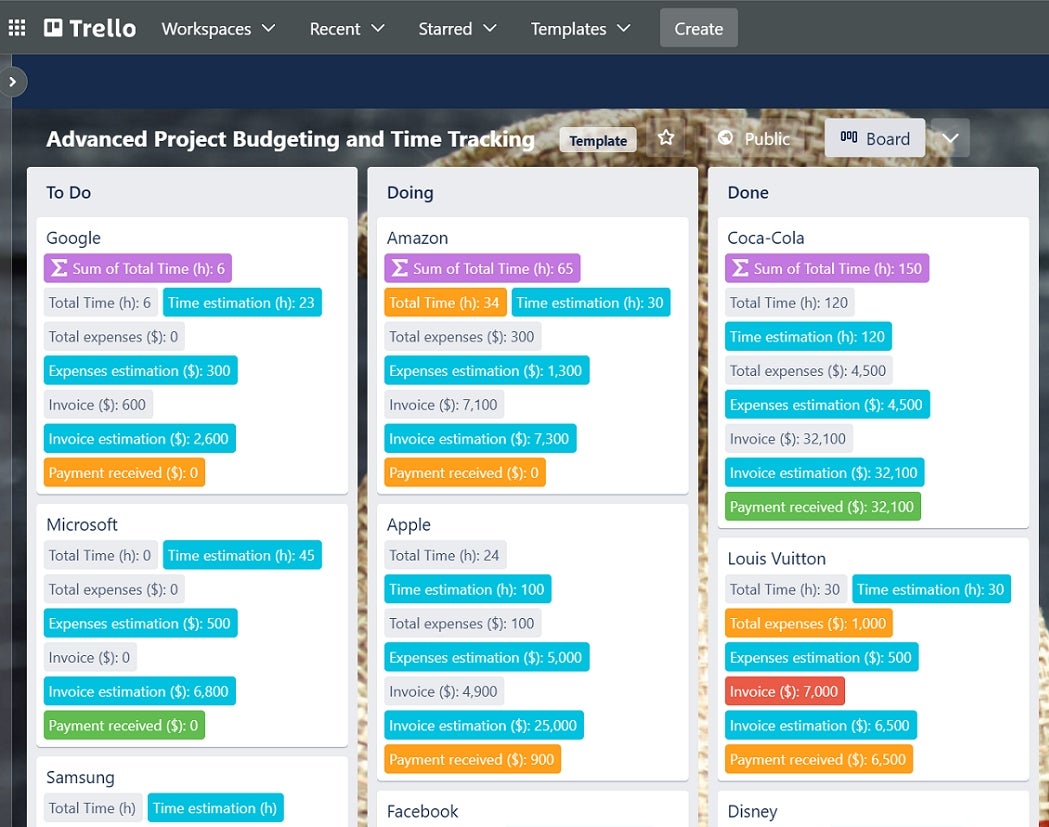
Pros
- All plans have unlimited storage for their workspace (but there are individual file limits).
- Intuitive and easy to learn.
- The free plan comes with two-factor authentication.
- Affordable for big teams and freelancers.
- Great for Agile Scrum workflows with a sprint system.
Cons
- Different work views are limited between plans, i.e., Free and Standard only have Kanban.
- The premium tier can only deactivate members.
- Enterprise plan has most of the admin controls, like governance and user provisioning.
- Not the best platform for detailed projects with extensive data to organize.
Top integrations
Trello’s top integrations include:
- Slack.
- Jira.
- Google Drive.
- Confluence.
- Dropbox.
Why we picked Trello
Trello caught our eye through its intuitive, board-based approach to project management, which makes it an intuitive and accessible asset for teams of all sizes. It’s flexible and has a wide range of integrations that make it easy to adapt to all sorts of visual project needs.
For more information, read our full Trello review.
Clickup: Best for customization of big projects

ClickUp is a project management tool for all-purpose needs. You will have access to automation, custom work views, collaboration and high-level security. If you’re looking for an array of tools and features to personalize your workspace and stay on top of projects, then you should consider Clickup.
Pricing
- Unlimited: $7 per user per month billed annually, or $10 per user per month billed monthly.
- Business: $12 per user per month billed annually, or $19 per user per month billed monthly.
- Enterprise: Custom pricing.
Features
- Multiple work views to personalize your workspace including Kanban, timeline, table, map and more (Figure B).
- Unlimited file storage for paid plans.
- Built-in option for video recording.
- Time tracking and reporting for staying on top of tasks.
- Natural language processing (NLP) can be used for scheduling in all plans.
- Workspace templates available to make setup easier for your team.
- ClickUp AI add-on for writing and editing content.
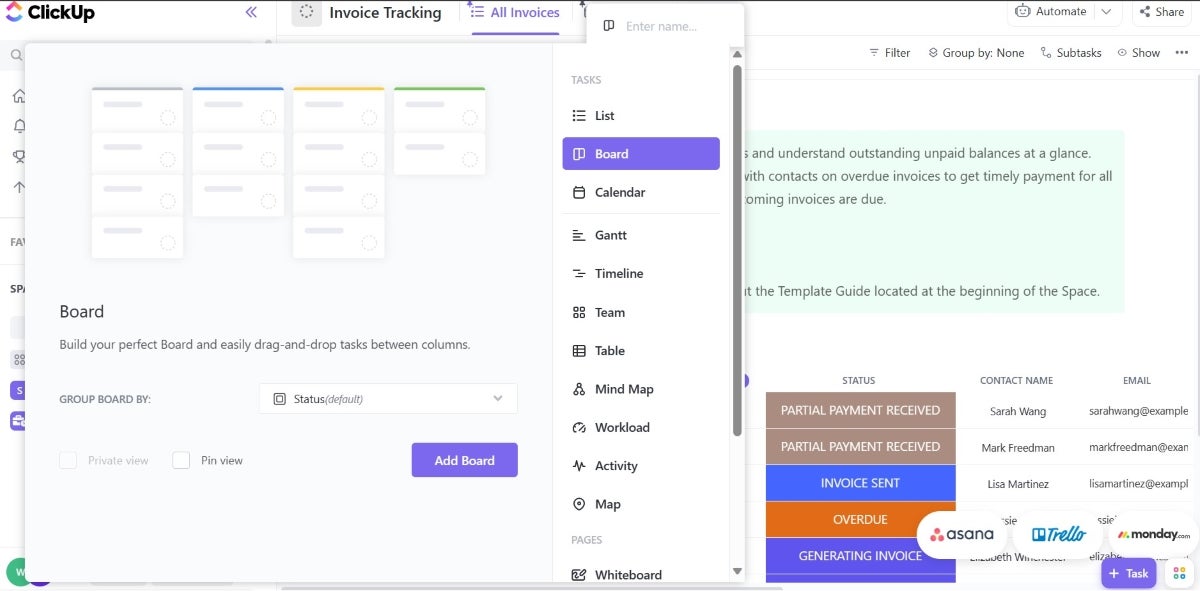
Pros
- Task automation for streamlining workflow.
- All plans have access to over 50 native integrations.
- All plans have at least two-factor authentication.
- 24/7 support (via Help Center) is available for all subscriptions, including the Free plan.
- Feature-rich enough to handle Agile Scrum projects with higher volumes of data or information.
Cons
- Business plan required to remove branding from emails.
- Only Business Plus and Enterprise can create custom roles for team members.
- Scrum teams may not like that only the Business plan has sprint reporting.
- Only Enterprise can have HIPAA compliance.
- Guests on paid plans are limited and charged unless they are view-only.
- The software can get pricey the more users and guests you add.
Top integrations
ClickUp’s top integrations include:
- Slack.
- HubSpot.
- Make.
- Gmail.
- Zoom.
Why we picked ClickUp
ClickUp is a versatile platform with customizable features for task management, document collaboration and goal tracking, meaning that it’s a great fit for projects that need flexibility and scalability. It’s easy to use and has a clean user interface, too.
For more information, read our full ClickUp review.
Zoho Projects: Best for upgrading tech stacks

Zoho Projects, like Microsoft Planner, is part of a suite of business software solutions. It can integrate with Zoho’s brand — full of applications to help with marketing, analytics and collaboration. If you’re looking for a powerful tool that comes with more value for the price, then Zoho Projects is worth taking a peek at.
Pricing
- Free: For up to two projects.
- Premium: $4 per user per month billed annually, or $5 per user per month billed monthly.
- Enterprise: $9 per user per month billed annually, or $10 per user per month billed monthly.
Features
- Multiple work views like Gantt charts, kanban and lists for project visualizations.
- Task dependency, which ensures certain steps are not completed out of order.
- Integrations with the Zoho suite, including Zoho CRM, Zoho Analytics and Zia AI chatbot.
- Also integrates with Google and Microsoft products, as well as Slack, Zapier and Zendesk.
- Time tracking for tasks and employees (Figure C).
- Custom statuses for tasks with unique steps.
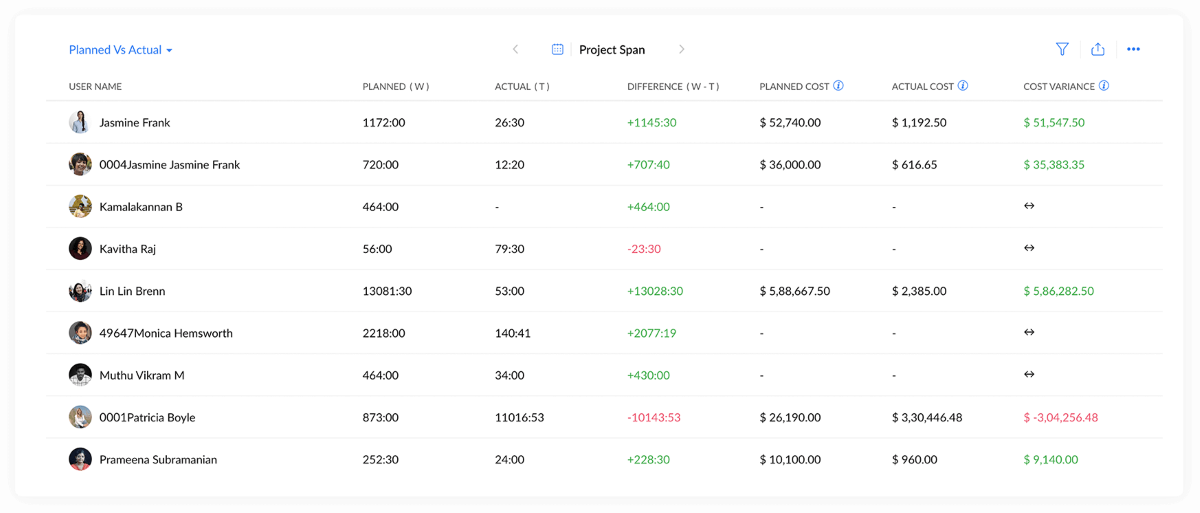
Pros
- Has problems tracking to catch issues with notifications or links.
- Teams have unlimited projects in Premium and Enterprise.
- Large amounts of storage space, from 5 GB in the Free plan to 100 GB in the next plan up.
Cons
- The Free plan only allows two projects and no exporting.
- Custom roles capability is only available in Enterprise.
- No guest users except read-only users, which are only available in Enterprise and are capped at 10.
Top integrations
Zoho Projects’ top integrations include:
- Zoho Apps.
- Google Apps.
- Microsoft Apps.
- Some CRMs.
Why we picked Zoho Projects
We selected Zoho Projects for its wide integration ecosystem, which allows it to seamlessly connect with a wide range of both Zoho apps and third-party tools. This connectivity enhances project management workflows and enhances collaboration and efficiency in project execution.
For more information, read our full Zoho Projects review.
Asana: Best for collaboration on a budget

Asana is a popular project management tool with some of the best capabilities for collaboration, such as multiple work views, customization, integrations and the ability to add unlimited guests to a paid account. If you don’t need full access for every collaborator, Asana is one way to get powerful functionality while offering cost savings.
Pricing
- Personal: Free for up to 10 users.
- Starter: $10.99 per user per month billed annually, or $13.49 per user per month billed monthly.
- Advanced: $24.99 per user per month billed annually, or $30.49 per user per month billed monthly.
Features
- Multiple work views such as lists, calendars, boards and forms (Figure D).
- Over 100 integrations with apps like Microsoft Teams, Adobe CC, Slack and Tableau.
- Custom fields and coloring for personalized labels.
- Workflow Builder for task and task assignment automation.
- Admin console for managing team members, insights, payment and security.
- Ability to add task dependencies so there’s an order of operations to your project.
- Mobile version for iOS and Android.
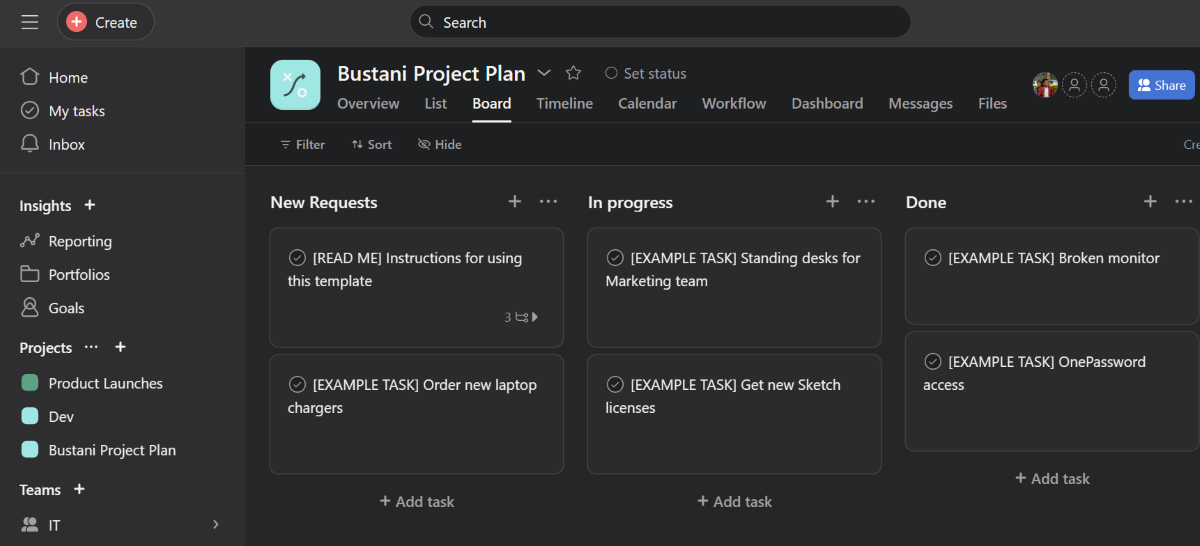
Pros
- You can view workloads to get the current status of your team’s progress.
- The free plan comes with 15 users, unlimited projects, integration access and multi-factor authentication.
- The Premium plans offer teams unlimited free guests to their accounts.
- Asana Intelligence can help your team with resource management.
- Large teams with contractors can benefit from unlimited, free guests.
Cons
- Can have a strong learning curve for beginners.
- 24/7 support is only available on the Enterprise plan.
- Guests can’t create or add anything to a workspace for team collaboration; you need to buy more seats.
- The Free plan doesn’t allow guests and isn’t ideal for big teams.
Top integrations
Asana’s top integrations are:
- Google Drive.
- Microsoft Teams.
- Slack.
- Zoom.
- Salesforce.
Why we picked Asana
Asana offers extensive task management and workflow customization capabilities, providing teams with the tools needed for detailed project planning and execution, along with seamless integration with other key software. Its feature set is much more expansive compared to Planner.
For more information, read our full Asana review and our comparison of Asana and Microsoft Planner.
Evernote: Best for research notes

Evernote is an affordable choice for personal, freelance and small team projects. If your workflow includes taking endless notes and saving research, ideas and drawings, then Evernote is worth looking into.
Pricing
- Personal: $129.99 per user for the year, or $14.99 per user monthly.
- Professional: $169.99 per user for the year, or $17.99 per user monthly.
- Teams: $249.99 per user for the year, or $20.83 per user monthly.
Features
- Customizable home page to focus on your preference of task or information (Figure E).
- Teams can utilize built-in encryption in their notebooks (on Mac and Windows).
- Include reminders in your notes so you can avoid losing track of important tasks or information.
- Users can save searches to jump back into.
- Character recognition search that can check images, PDFs and handwritten notes.
- Uninterrupted workflow with offline access to notebooks.
- Integrations like Slack, Salesforce, Microsoft Teams and Google Drive.
- Drawing tools for sketching and handwriting notes.
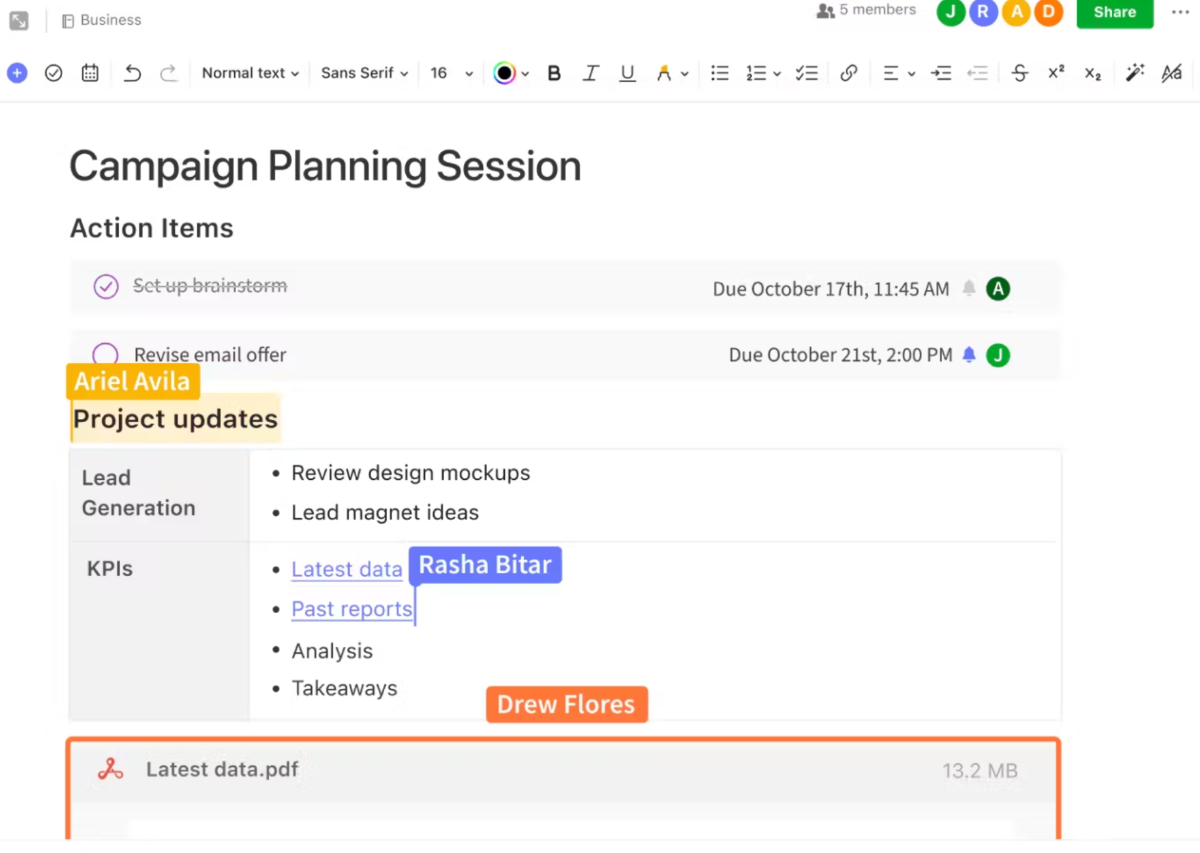
Pros
- Two-factor authentication with all plans.
- Easily share your notebook with all plans.
- Share notes with view and edit restrictions, even in the Free plan.
- Free is a good option for freelancers or personal organizational needs.
Cons
- Most plans are designed for personal use and only the Evernote Teams plan will work for large teams.
- Only Evernote Teams has real support — on other plans, you can only submit requests on a ticketing system.
- Free plan does not include integrations.
- Only the Professional tier lets you export notebooks as PDFs.
Top integrations
Evernote’s top integrations include:
- Google Calendar.
- Google Drive.
- Gmail.
- Slack.
- Microsoft Outlook.
Why we picked Evernote
Evernote made our list because of its exceptional note-taking and information organization capabilities. Its ability to sync across devices and integrate with productivity tools makes it an invaluable resource for keeping project information centralized and accessible.
If you need more information, read our full Evernote Review.
Best for simple project needs: Trello Best for customization of big projects: Clickup Best for upgrading tech stacks: Zoho Projects Best for collaboration on a budget: Asana Best for research notes: Evernote Microsoft Planner is one of the many business solutions available with a Microsoft 365 subscription. It offers classic project management tools like different…
Best for simple project needs: Trello Best for customization of big projects: Clickup Best for upgrading tech stacks: Zoho Projects Best for collaboration on a budget: Asana Best for research notes: Evernote Microsoft Planner is one of the many business solutions available with a Microsoft 365 subscription. It offers classic project management tools like different…
